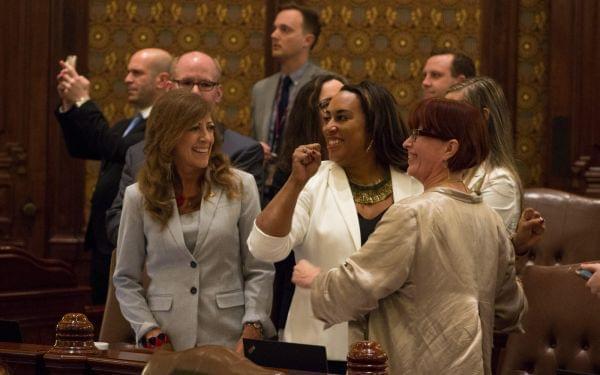Senate Votes For Legal Cannabis — House Vote Remains

Illinois state Senators celebrate the passage of legislation to legalize marijuana. The lead sponsors were Sens. Heather Steans, right, and Toi Hutchinson, center. Brian Mackey/NPR Illinois
Illinois state Senators approved a proposal on Wednesday to legalize recreational marijuana for adutls 21 years and older beginning on January 1, 2020.
With a roll call of 38-17, the measure received support from three of the Republicans in the chamber while two Democrats decided to vote "no."
Rock Island state Sen. Neil Anderson is one of two Republican co-sponsors of the proposal. He said even though he was voting in favor, he personally is still against cannabis use.
“I will continue to tell my kids that they should not smoke tobacco, they should not smoke cannabis and that is my job as a responsible parent," said Anderson. "But to those adults out there that want to use cannabis, as I’ve said before, freedom is freedom.”
In an effort to pick up more votes, the sponsors did make key changes to the original proposal that was rolled out earlier this month. One of those changes deals with the ability to grow cannabis at home. Initially, all adults could grow cannabis in their home but the new language narrows it to medical marijuana patients only.
Ok. Here are some initial changes I've found:
— Jaclyn Driscoll (@DriscollNPR) May 29, 2019
As previously reported, this proposal has changed the stipulations for who can grow cannabis in their home. It is now limited to adult medical patients. Still can grow up to five plants in a secure location of their home.
Those who spoke in opposition of the measure said they were concerned about the safety of kids and teens, as well as mental health and addiction issues associated with the drug.
Gov. J.B. Pritzker campaigned on the promise to legalize recreational cannabis. In a statement he said:
“Illinois is poised to become the first state in the nation that put equity and criminal justice reform at the heart of its approach to legalizing cannabis, and I’m grateful that the Senate has taken this important step with a bipartisan vote. Senators Steans and Hutchinson have done tremendous work to reach this point, and I encourage the House to take decisive action to make Illinois a national leader in equity and criminal justice reform.”
The measure needs to be approved by the House and Pritzker before becoming law.

